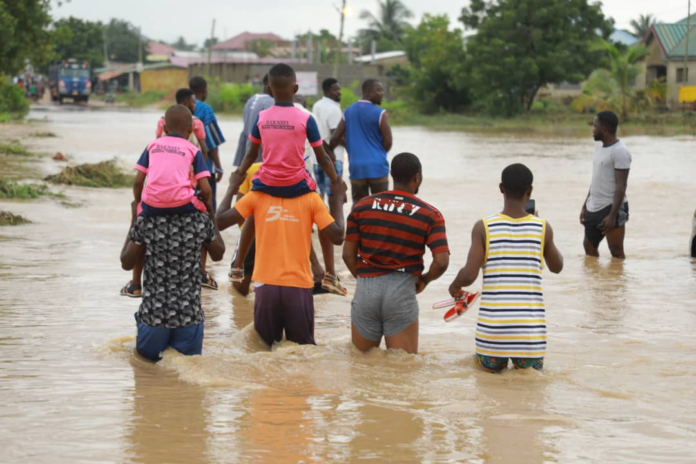
The Ghana Meteorological Agency (GMet) has warned that the distribution of this year’s March-April-May (M-A-M) rainfall may lead to more localised floods in places along the coast and its inland areas.
It also said flash floods may occur during the peak of the season, which may lead to flooding in, especially, low-lying areas and in-built places along watercourses.
In this year’s seasonal forecast made available to the Daily Graphic, the rainfall pattern is largely expected to be normal to below normal, although the GMet said the vulnerability of residents along the coast and low-lying areas had increased due to the continuous erection of structures in watercourses, as well as inadequate and chocked drainage systems.
It said floods in those areas were going to be massive this year due to their low resilience to adapt to heavy rains.
Seasonal forecast
According to the forecast, there was also a high probability of relatively long dry spells at the beginning and towards the end of the M-A-M season, with normal or rainfall deficit.
It said this may lead to drought in some places in the southwestern parts of the country during the M-A-M season.
It also predicted that the April-May-June (A-M-J) season would be normal to above normal.
Below normal flows were expected in the Tano and Ankobra basins, while normal to above-normal flows were also expected in the Pra and Densu basins.
Safety precautions
To mitigate any risk that might occur to people, animals, crops and material goods, the Deputy Director and Head of Research and Applied Meteorology at the agency, Francisca Martey, has recommended that early warning systems for flood risk should be activated, while people living in exposed areas should be sensitised to the impending danger.
She also advised light aircraft to avoid flying through deep convective clouds that were associated with severe turbulence and lightning.
Mrs Martey said the floods might lead to some roads becoming impassable and advised users to be mindful when plying those roads.
She further urged the public to be mindful of fallen trees and objects on the roads during or after a storm.
Health precautions
In places where the rainy season is wetter, she said there would be higher levels of the risk of cholera, malaria, dengue fever, bilharzia and diarrhoea.
To mitigate the development of germs and reduce the risk of diseases, she recommended that public education should be intensified through national platforms on disaster risk reduction through the media and information vans.
Mrs Martey further advocated strong collaborations among stakeholders such as the meteorological, hydrological and disaster organisations.
In the event of heavy rains accompanied by strong winds and lightning which could lead to localised floods, she advised the Electricity Company of Ghana to cut power when necessary to avoid electrocution.
Agriculture
For areas likely to experience water deficits due to the normal to below normal rainfall and the longer dry spells at the beginning and towards the end of the season, Mrs Martey advised farmers to focus on drought-tolerant species and early maturing varieties.
She further encouraged farmers to diversify income-generating activities and promote agricultural practices such as minimum tillage, mulching, selective pruning and agroforestry to offset the production deficit that could affect them.
Assemblies preparedness
Some assemblies, particularly those in flood-prone areas, have also indicated their preparedness for the rainfall season.
Already, some assemblies have commenced dredging choked gutters and have also found other innovative ways to mitigate the impact of the season.
The Chief Executive of the Korle Klottey Municipal Assembly, Nii Adjei Tawiah, told the Daily Graphic that the most affected places such as areas around the Odaw River had been dredged.
Additionally, he said choked gutters around Osu, Adabraka and Asylum Down had been desilted, while some structures along watercourses had also been demolished.
“We can’t say we are fully prepared towards the season because we don’t know how heavy the rains will come but we have tried every possible means to ensure the impact is not as heavy as the previous years,” Mr Tawiah said.
ALSO READ:
Health Ministry responds to ECG’s ultimatum to 91 hospitals over debt…
Health Ministry responds to ECG’s ultimatum to 91 hospitals over debt…
Family of Ghanaian gay man seeking asylum in Canada attacked in Ghana

